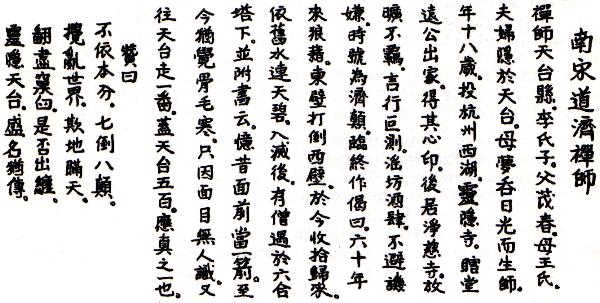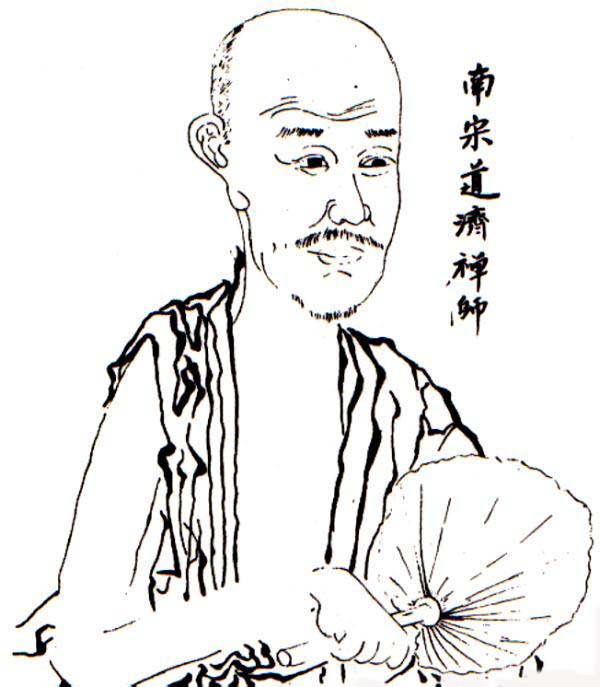|
While
he was still at Ling Yin, the Great Compassion Pavilion was destroyed by fire.
The manager knew that although no one in the temple could stand Tao Chi, all the
wealthy lay people believed in him since he cured their illnesses by such
unusual means as taking a drop of sweat from his armpit and giving it as
medicine, which produced an instant cure. Master Chi declined a request to
solicit funds from his lay followers, and so the manager invited all of the
patrons to a great banquet at which they were to subscribe to the reconstruction
of the burnt hall. Before the banquet, however, Master Chi instructed the lay
people to give only one small coin each. At the end of the banquet, the manager
found that not only did he not have enough to reconstruct the building; he
hadn't even received enough to cover the meal. The lay people were naturally
slightly ill at ease over this, and so the Master invited them to a second
banquet and told them that they could give whatever they liked, a remark which
elicited such a flood of donations that ten halls could have been built to
replace the destroyed one.
Once
when a temple was being built, he was given the job of buying wood for
construction. He went to Szu Ch'uan, on the other side of China, to purchase
supplies, and told the lumberyard to drop the whole lot in the river. Back where
construction was going on a well suddenly appeared in the ground out of which
wood began to erupt board after board. Soon so much had accumulated that there
was no room to store it, and the manager shouted out, "ENOUGH!"
whereupon the flow of wood stopped instantly. In fact, there remained one board,
which stopped halfway out of the water. The well took its name, Yu Mu Ching,
"wood-giving-well", from this event, and the one board, which remained
stuck, can still be seen just where it stopped.
Anyone
who is able to manifest such powers and do the deeds of Arhats can carry on and
disobey the rules. If one is unable to do so, he must maintain all the rules of
training. When the Master was living at Ch’ing Ts’e Monastery, he would go
out drinking at night and come rolling home unable to walk a straight line. He
would fall asleep in the kitchen, in front of the Buddha images, or anywhere
else he happened to find convenient.
He
had two disciples who used to rob from the rich and give to the poor. Once he
told them that they ought to leave home and prepared to shave their heads by
dunking them in a huge cauldron of boiling water. Terrified, they ran off.
Absolutely
no one understood what he was up to although afterwards people sometimes came to
realize what he had been saying. He was often found in brothels and bars,
totally drunk. He never worried that people would speak ill of him or spread
slanderous stories about his behavior; even though others did not, he understood
quite well just what he was up to. Before his extinction he said the following
verse,
"For
sixty years I've been a wolf,
The
eastern wall bumps the west.
I'm
packing up. I'm going back,
Old
water and the sky still blue."
After
his death a monk met him at the foot of Six Harmonies Mountain in Hangchou where
the Master passed on the following letter:
"Once
there was an arrow before my face,
And
even now my bones and hair are chilled. Others have yet to recognize this face
I'll
make it back to T'ien T'ai and have a go again."
The
Master was one of the five hundred Arhats of T'ien T'ai, the place where
Avalokitesvara and the Arhats had a contest in which one was to bridge a deep
chasm while the others made a pagoda. Avalokitesvara bent the peaks of two
mountains together while the 500 Arhats stole all the bricks from the chimneys
in T'ien T'ai County to make their stupa. For this reason you will find that
there are no chimney bricks in that area even to this day. The contest had been
undertaken with the understanding that whichever party had finished the work by
cockcrow would be declared winner. As soon as Avalokitesvara had bent the peaks
together, he set to crowing like a rooster and caused all the other roosters to
join in. The Pagoda of the Five Hundred Arhats remains unfinished even now.
Because
the Master was so outrageous, because he wanted to sleep when others meditated
and meditate while others slept, because he relieved himself when the others
were eating, occasionally on the floor of the dining hall, everyone was
displeased with him. Consequently his eulogy says,
Exasperating the world,
Deceiving Heaven and Earth,
Dumping the model vessel,
Might he be one unbound?
Around Ling Yin and T’ien T’ai
Everyone knows his name.

|

